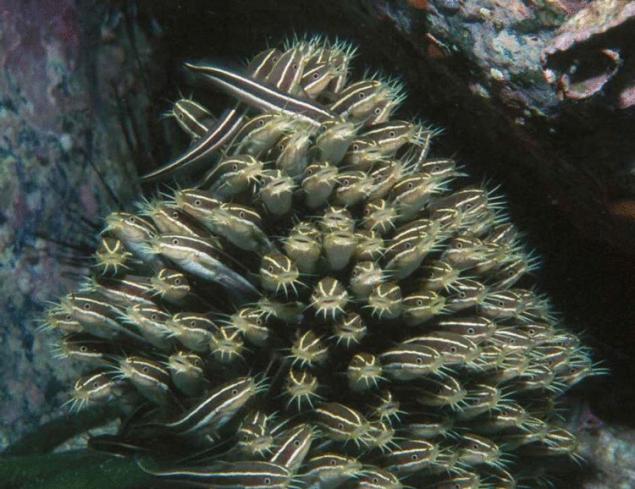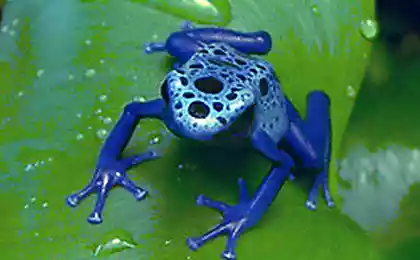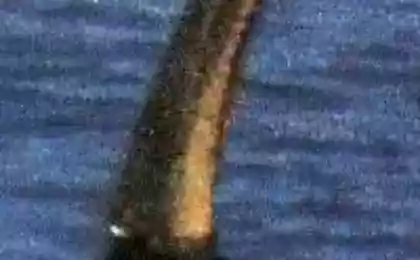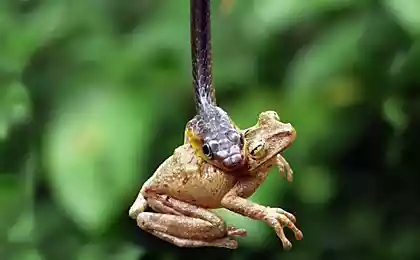394
Pregolya soma sniff out prey on the acid trail
Japanese Pregolya catfish Plotosus japonicas able to feel their "mustache" small changes in the acidity of water around the bottom hiding the worms on which the fish prey.
Ugrevoy catfish Plotosus japonicas lives on the southern Japanese Islands, eating worms and crustaceans, which are looking at night on the bottom. Among the fishermen of P. japonicas does not enjoy great popularity – his fins are equipped with venomous spines, a shot which can cause severe pain and prolonged inflammation. But wonderful this catfish not only poisonous weapons. As found by researchers from the University of Kagoshima and the University of Louisiana, P. japonicas have an interesting ability – they can locate prey by traces of acid.
These fish, like all catfishes, the head is a kind of appendages-the"whiskers". The researchers noticed that the "whiskers" of P. japonicas are particularly sensitive to changes in concentration of carbon dioxide and hydrogen ions in the water. Of hydrogen ions determines the acidity of the medium, and further experiments have shown that fish are guided by the fluctuations of acidity, when looking for food.

When P. japonicas planted aquarium with worms, then fish most of the time spent there where I was hiding worms as it turned out, the worms slightly sakaleli the water around yourself, increasing the concentration of hydrogen ions and thus lowering the pH. The researchers tried to fool soms in arranging aquarium artificial plots with high acidity, but without any worms. The deception was a success – P. japonicas was drawn to these places, although no production was not there. Soma found that smells sour, even in complete darkness. Obviously, this ability has P. japonicas is very useful, as they, as we said in the beginning, come out to hunt at night.
As the researchers write in their article in Science, the best catfish whiskers to detect changes in the acidity if the water pH is 8.1 and 8.2, that is, as in sea water. If the acidity is higher than usual (for example, pH=8,0), P. japonicas no longer feel where the acid is more and where less. Although these catfish have become the first species of fish that can feel the "smell of acid", the authors believe that this ability has many other types, you only need to look.
From an environmental point of view, the new data cause more trouble to treat the acidification of the oceans in a high carbon dioxide content in the atmosphere – among other adverse effects excess acid may simply deny some fishes ability to find food.
Source: nkj.ru
Ugrevoy catfish Plotosus japonicas lives on the southern Japanese Islands, eating worms and crustaceans, which are looking at night on the bottom. Among the fishermen of P. japonicas does not enjoy great popularity – his fins are equipped with venomous spines, a shot which can cause severe pain and prolonged inflammation. But wonderful this catfish not only poisonous weapons. As found by researchers from the University of Kagoshima and the University of Louisiana, P. japonicas have an interesting ability – they can locate prey by traces of acid.
These fish, like all catfishes, the head is a kind of appendages-the"whiskers". The researchers noticed that the "whiskers" of P. japonicas are particularly sensitive to changes in concentration of carbon dioxide and hydrogen ions in the water. Of hydrogen ions determines the acidity of the medium, and further experiments have shown that fish are guided by the fluctuations of acidity, when looking for food.

When P. japonicas planted aquarium with worms, then fish most of the time spent there where I was hiding worms as it turned out, the worms slightly sakaleli the water around yourself, increasing the concentration of hydrogen ions and thus lowering the pH. The researchers tried to fool soms in arranging aquarium artificial plots with high acidity, but without any worms. The deception was a success – P. japonicas was drawn to these places, although no production was not there. Soma found that smells sour, even in complete darkness. Obviously, this ability has P. japonicas is very useful, as they, as we said in the beginning, come out to hunt at night.
As the researchers write in their article in Science, the best catfish whiskers to detect changes in the acidity if the water pH is 8.1 and 8.2, that is, as in sea water. If the acidity is higher than usual (for example, pH=8,0), P. japonicas no longer feel where the acid is more and where less. Although these catfish have become the first species of fish that can feel the "smell of acid", the authors believe that this ability has many other types, you only need to look.
From an environmental point of view, the new data cause more trouble to treat the acidification of the oceans in a high carbon dioxide content in the atmosphere – among other adverse effects excess acid may simply deny some fishes ability to find food.
Source: nkj.ru























